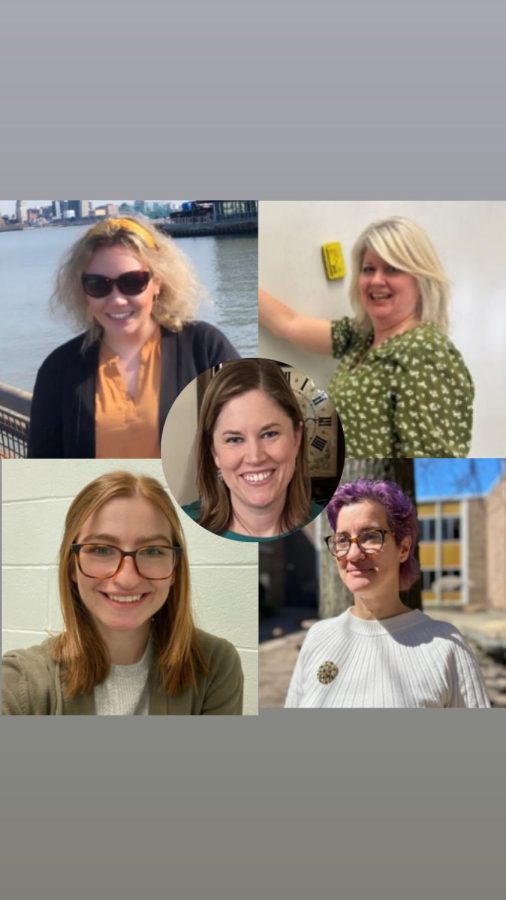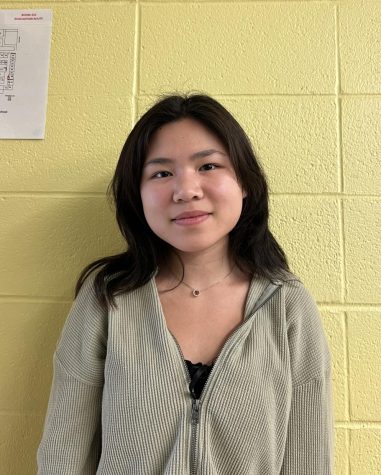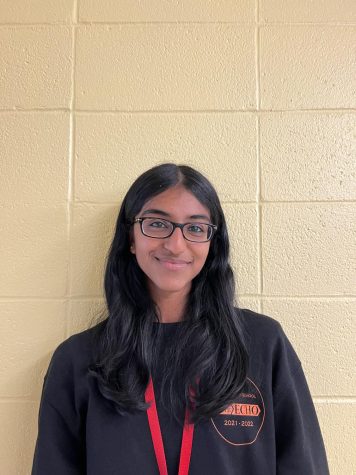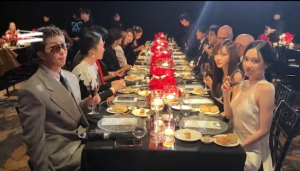The Stories of Five THS Teachers
April 20, 2023
It is crucial to learn more about our school’s staff, each of whom supports the operation of our building and the education of us students. Following Women’s History Month, we invited these five teachers to share interesting and meaningful stories about their lives, and explain why Women’s History Month is important to them.
Have you ever struggled with factoring? So have Ms. Nager’s students. She has had many great experiences in her 30 years of teaching mathematics, but her favorite in general is when a student has that “aha moment,” meaning that she helped the student finally understand the material. “[My] students in an Algeo 3 class were not understanding factoring and nothing was working,” Ms. Nager said. So, that night, she went home and figured out a way to teach the topic. It became known as the “Nobes method” because that is her maiden name. Teachers around other school districts use this method to this day.
Ms. Nager has always loved math and it has always come very easily to her. “Back in the day, women were told that ‘girls can’t do math.’ I know it’s something that none of you can understand nowadays, but it was true at the time. I was definitely stereotyped for the color of my hair growing up, so I was very determined to prove that statement false, and that is one of the sole reasons I studied mathematics. Again, this is something that none of you can understand anymore, and I am so grateful for that for all of you young women,” Nager said.
That being said, Women’s History Month is very dear to Ms. Nager because she thinks it’s important to honor what women have done and accomplished over the years. She praises Susan B. Anthony and Rosa Parks, with whom her daughter was obsessed. “I wish I could have made a huge impact on history and joined these ranks, but I will have to settle for hopefully impacting the lives of the thousands of students I have taught over the years. Just maybe, I did make a difference in one of their lives.”
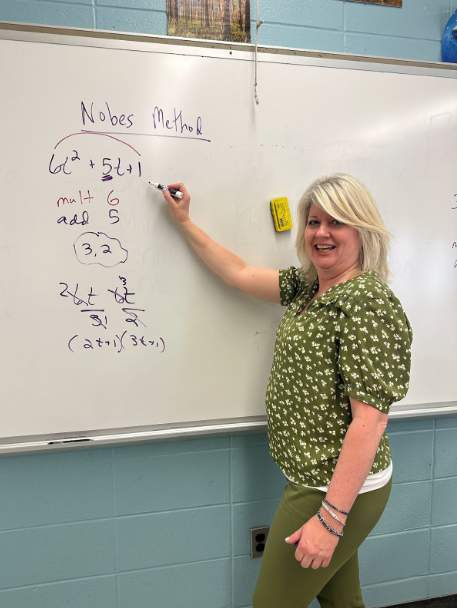
The most meaningful experience of Ms. Nager’s life was the death of her sister, who unfortunately passed away at 35. Her sister had called her the Friday of Super Bowl weekend. “I was too busy to talk,” Nager said. She never heard her sister’s voice again. Ms. Nager learned a valuable lesson that day: take the time to talk to someone because you never know if that will be the last time. Ms. Nager shared that now is the most challenging time of her life. Her mother is ill and she is dealing with that situation. Nager also spoke of her rough divorce, which took four years. Despite all of these challenges, Ms. Nager has a positive outlook: “As a result of this, my children are very angry and upset with me. So every day has been a challenge. I guess the positive is that I do come to school every day and don’t think my students would ever have a clue as to what I have or currently am going through. I wear a shirt sometimes which says ‘f(x)=|x| and no negativity.’ I really am trying to be positive in life. What is getting me through all of this is concentrating on my work, exercising/dancing, meditation, my faith, an unbelievable support system of friends and family, and music/shows/concerts. I am literally taking each day as it comes and trying to find the good in each moment,” Nager said.
With many experiences comes much wisdom. Ms. Nager has two mottos: “too much of anything is not good,” which connects to how she tries to use her entire bag of tricks to keep students interested in learning; another is “always appreciate the time you have with someone because you can’t get it back,” deriving from the Scotty McCreery song, “Five More Minutes.” She wants students to know that life has a weird way of working out, and tries to tell them that where they will be going might actually be the right place for them. “Sometimes they worry so much about college applications, and I always want to say to come back to me in 20 years and let me know if it all worked out in the end. I do think it does,” Nager said.
Teaching for three years at Tenafly, Ms. Barone is a physical science and forensics teacher. For her, Women’s History Month is important because “it gives an opportunity to reflect on the incredible impact women have had and it reminds [her] that the path she follows as a woman in STEM has been paved by all of the women before her fighting for equity through adversity,” Ms. Barone said.
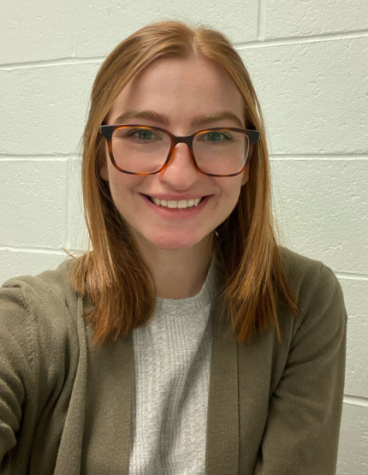
Speaking about personal experiences, Ms. Barone explains how she faced several challenges on her journey to becoming a physics major. On the first day of college, she was told by a male faculty member, “You know you’re going to have to take nerd classes, right? Are you sure you want to do this?” And, even before that, there were many people who discouraged her from pursuing science because they were worried about her being stressed or overwhelmed with schoolwork. But, she didn’t let them discourage her. She graduated from Montclair State University with a B.S. in Physics and although it wasn’t easy, she published the research she conducted in optical physics. She worked with an amazing group of physicists who shaped her as a person by teaching the importance of patience and hard work.
Patience is important when teaching high school students, so one quote that she lives by to get through tough days in and outside of the classroom is “bloom where you are planted; many things in life are out of our control, and we will need to learn to adapt and be flexible when dealing with challenging situations.”
So, what’s her advice for young, aspiring scientists? She thinks the best way to overcome a situation that challenges you is to keep your goals at the center of your actions, and keep moving towards what you really want.
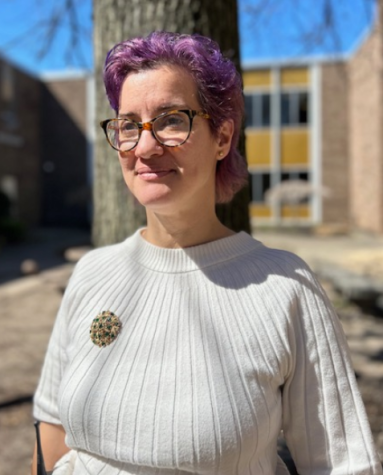
You may have seen this next teacher in the halls, undeniably noticing her brightly colored hair. Ms. Pelaez-Martinez has been teaching since 2002, this year being her 21st. She teaches both Spanish and Italian here at THS. “The month itself isn’t important to me because I feel history should include all voices and all of the characters,” Pelaez-Martinez said. She wants the world to realize that history is not just about the victor or the vanquished but rather all the different people and events in between as well.
Pelaez-Martinez has shared that the most important thing to happen to her was her parents’ leaving Cuba in the 1960s with the assistance of her aunt and uncle. She reflects on how her life would be very different if her family had never left, appreciating the liberties and freedom she has here.
“Unless you live in a cave, there is no way anyone hasn’t faced a challenge in life!” Pelaez-Martinez said. She believes that everyone we encounter has something they are struggling with. How should we deal with our struggles? “Be brave enough to know that you don’t know everything and learn from your mistakes. Life is not linear, nor is it predictable,” Pelaez-Martinez, a wise mother of three, said.
A relationship between teachers and students can be incredibly cherishable and special. Pelaez-Martinez said that her favorite aspect of teaching is seeing students progress, stating, “That is what keeps you going.” Another favorite part about teaching is knowing that she has a job that really affects other people. She shares that she is not only in contact with ex-students, but also in contact with her past teachers. She advises students to branch out and “make the effort to interact with your fellow in-the-flesh humans a little more. We are lucky to be surrounded by really interesting people and if you don’t take the chance to talk to them, you are missing out.”
One quote Pelaez-Martinez lives by is a hybrid between an Oscar Wilde and Dr. Seuss quote: “Be yourself: everyone else is already taken. Because those who mind don’t matter and those who matter don’t mind. For many reasons, it is an act of courage to be yourself. Sometimes it is perceived as selfish, but I think I am learning that I am a work in progress and that I have to be brave enough to be me, warts and all.” She embraces loving her true self and encourages others to do the same.
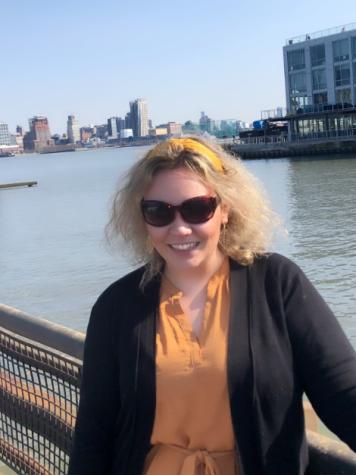
Teaching in the history department for five years, Ms. Griffin “loves history and the story behind it.” After graduating from Nyack College with a degree in Secondary Education and a concentration in Social Studies in just two years, she was appointed Director of Marketing and Public Information and Education Outreach at just 20 years old in a historical society. Although expediting her bachelor’s was a very crazy time in her life, it was well worth it because she entered the workforce earlier and had more real-world opportunities. In her first job, though, she recalls that she “was very overwhelmed and anxious about being able to succeed in [that] position and really scared to fail.” Fearing failure, she explains, is natural for students but “learning to be okay with failure is a really important lesson that she tries to remember every day.”
Growing up, Ms. Griffin had a grandmother who worked as a single mother in the ’60s, when divorce was uncommon and opportunities for women were scarce. Unlike her grandmother, she feels “very lucky to not have had as many limits or challenges in [her] career because she knows there are many women fighting for the right to have their voices heard or even be given a seat at the table.” However, hearing about the struggles her grandmother experienced has made Ms. Griffin feel grateful for the opportunity to help other women amplify their voices. Women’s History Month is not exclusively for honoring the achievements of trailblazing women and reflecting on the hardships women have overcome. It is also for supporting women in general. Whether it be supporting a women-owned small business or donating to charities that empower women and girls, there are many ways we can spread awareness.
Ultimately, for Ms. Griffin, Women’s History Month is meaningful because “it’s a time to celebrate the accomplishments of other women who have been overlooked previously, and it’s a great time for women to lift each other up.” Griffin commented on how the progress society has made—from women being underappreciated and underestimated just 50 years ago to working in previously male-dominated industries—is exciting but understands that there is always room for improvement. She’s learned that actions matter more than words;
So, what does this hockey fan and cheer enthusiast have to say to students? Although students are stressed with planning for the future, Ms. Griffin suggests that you actually don’t have to have it all planned out. Instead, Griffin explained, taking advice from people when needed, pursuing activities that interest you, and focusing on balancing your school and social life is more important.
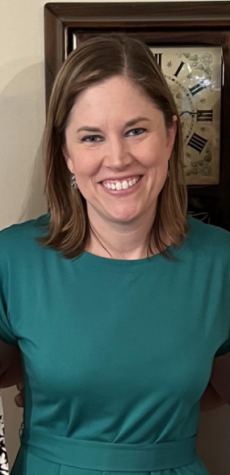
A spirited teacher with an affinity for literature, Ms. Hampson has been teaching English at Tenafly High School for 20 years. Why English? “One of the most important skills we all need is the ability to think critically,” Ms. Hampson said. “Literature classes challenge students to read between the lines, distinguish appearance from reality, empathize with fellow human beings who are being mistreated by society, and hopefully they inspire us to make positive changes in the world.”
Making positive changes is exactly what Ms. Hampson does in the Tenafly High School community. She encourages students to never quit no matter how hard it gets. “I’ve been through a number of difficult moments in my life, and I’ve wanted to give up on more than one occasion. Thankfully, I have some wonderful family members and friends who have supported me through those tough times and given me the courage to continue,” Hampson said. “Surround [yourself] with positive people who love you for who you are.” Ms. Hampson loves when her students make a connection between the classic literature they study and the world today. She also loves when students see the fruits of their labor. A challenge she has yet to overcome is convincing reluctant students that their own ideas are more valuable than those of a web site, like SparkNotes or ChatGPT. “I wish I could inspire students to trust their own reading of a story,” Hampson said.
Ms. Hampson says that her life would have been completely different had she not enrolled in a Shakespeare class in college. She had previously been a political science major with a pre-law minor, pursuing her dreams of going to law school. However, after that Shakespeare class opened her eyes to how exciting and relevant classic literature can be, she ended up switching majors to English Literature, and never looked back. “I often wonder if I would’ve continued on that law school trajectory had I not taken that amazing Shakespeare class. To this day, I am so thankful that I took that class,” Hampson said. Women’s History Month is important to her because women are often not always acknowledged or appreciated when working behind the scenes in vital roles.
Overall, Women’s History Month is a time to reflect on the fight for equality. Whether pursuing careers that are male-dominated or persevering despite being discouraged, women have come a long way. The stories of these five THS teachers remind us of the accomplishments women have had, and show us how powerful, creative, and capable women truly are. Despite Women’s History Month only being one month, make sure you are always grateful and mindful of women’s everyday accomplishments!












































































































































